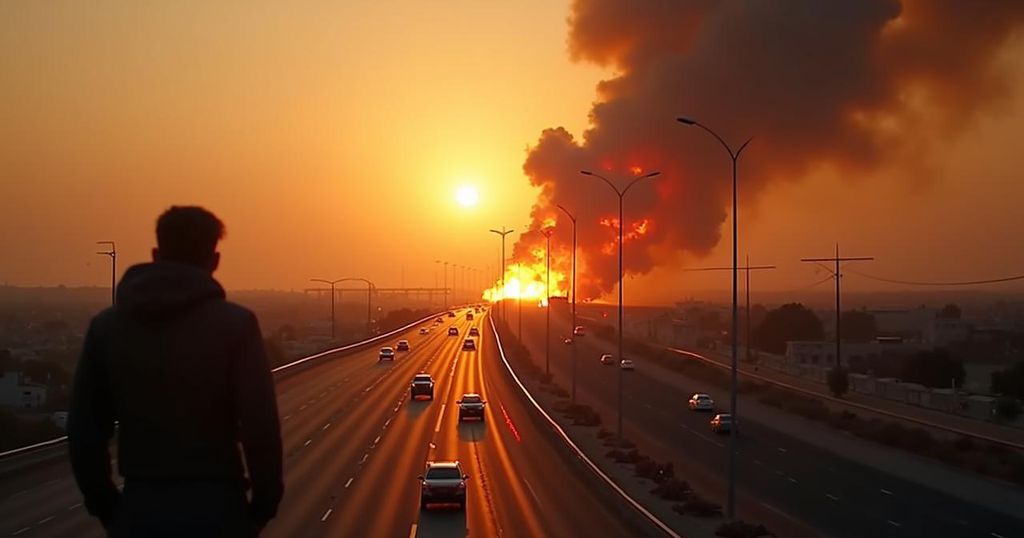An Israeli airstrike has severed a vital highway linking Lebanon with Syria, causing significant disruptions to refugee movements amid escalating violence between Israel and Hezbollah. Iranian Foreign Minister Abbas Araghchi’s discussions in Beirut coincide with renewed military actions from Israel as the situation intensifies, raising concerns over a broader regional conflict and humanitarian implications.
An Israeli airstrike has recently severed a critical highway that connects Lebanon with Syria, as reported by Lebanon’s state-run National News Agency. This operation has resulted in the closure of a roadway near the Masnaa Border Crossing, which has been a vital exit point for tens of thousands of individuals fleeing the conflict in Lebanon into Syria over the last fortnight. The Israeli military initiated a ground incursion into Lebanon against the Hezbollah militant faction and has conducted multiple strikes in Gaza, leading to significant casualties, including children. The conflict has seen the loss of nine Israeli soldiers, with a marked increase in hostilities since Hamas’s cross-border attack on October 7, 2023, which resulted in the deaths of 1,200 Israelis and the abduction of 250 others. In retaliation, Israel declared war on Hamas, causing over 41,000 Palestinian fatalities in Gaza, predominantly impacting women and children, according to local health officials. Tragically, nearly 2,000 individuals have also perished in Lebanon, principally since September 23, 2023, as documented by the Lebanese Health Ministry. In other developments, Iranian Foreign Minister Abbas Araghchi’s visit to Beirut is noteworthy, as he is expected to discuss the ongoing conflict with Lebanese officials. Iran, a long-time ally and supporter of Hezbollah, has been providing substantial military and financial assistance. His arrival coincided with Israel’s renewed airstrikes across various regions of Lebanon, including southern Beirut, south Lebanon, and the eastern Bekaa Valley. This comes on the heels of Iran launching at least 180 missiles into Israel, further escalating the situation and raising concerns over a potential regional war. The airstrike that cut off the Masnaa Border Crossing marks the first closure of this significant transit route since hostilities intensified. According to Lebanese General Security, over 250,000 Syrians and more than 80,000 Lebanese refugees crossed into Syria during the last week of September following Israel’s substantial bombardment of southern and eastern Lebanon. Despite the closure of key routes, several other border crossings between Lebanon and Syria remain operational, and the minister of public works in Lebanon has confirmed the oversight of these crossings by the state. Hezbollah’s military logistics are heavily reliant on Iranian support which is funneled through Syria, with the group actively engaged alongside Syrian forces in the ongoing conflict.
The recent escalation in violence between Israel and Hezbollah has roots in long-standing tensions following the cross-border attack initiated by Hamas, which triggered a fierce response from Israel. The Israeli military has took offensive actions into Lebanon and Gaza, resulting in severe casualties on both sides. Moreover, Iran’s involvement through its support of Hezbollah adds a layer of complexity to the conflict, with diplomatic developments signifying potential ramifications for future engagements in the region. The situation at the Lebanon-Syria border is critical, as it affects the movement of refugees and could influence the broader humanitarian landscape amid extensive military operations.
In summary, the Israeli airstrike that severed the highway between Lebanon and Syria represents a significant strategic development in the ongoing conflict. The subsequent humanitarian implications, alongside the heightened military engagements involving Iran and Hezbollah, suggest that the situation remains precarious, with the potential for escalation into a wider regional conflict. The international community’s response to this unfolding crisis will be crucial in shaping future engagements and addressing the humanitarian needs of those affected by the violence.
Original Source: abcnews.go.com






